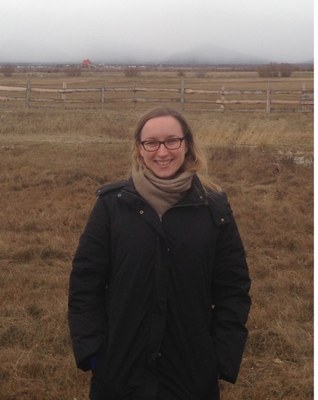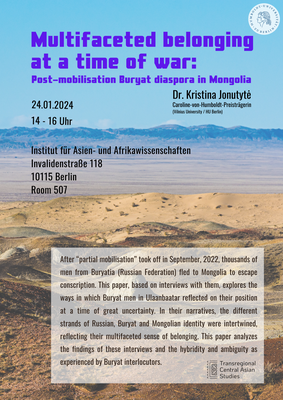Dr. Kristina Jonutytė
- Name
- Dr. Kristina Jonutytė
Dr. Kristina Jonutytė, visiting scholar
Dr. Kristina Jonutytė is the recipient of the Caroline von Humboldt Prize 2023 and with her current research project “Buryat Belonging” affiliated with the department of Transregional Central Asian Studies at IAAW. Kristina is a visiting scholar at the Central Asia Seminar. She is a social anthropologist, and her research interests include political and economic anthropology, ethnicity, identity and religion, especially in Buryatia, Inner Asia, and post-Soviet Eurasia. She has been conducting research on Buryat religion and society since 2015, with a particular focus on the post-Soviet resurgence of Buddhism in Ulan-Ude, and has conducted 13 months of ethnographic fieldwork in the Republic of Buryatia.
She defended her PhD at Max Planck Institute for Social Anthropology and Martin Luther University Halle Wittenberg (Halle, Germany) in 2019, with a thesis on Buryat Buddhist giving practices and belonging in the urban context of post-Soviet Ulan-Ude. More recently, she has started a new research project that explores Buryat racialisation and belonging in contemporary Russia, in the context of the war in Ukraine, with a particular focus on Buryat outmigration to Mongolia. Since defending her PhD, she has held research and teaching positions at Vilnius University and Vytautas Magnus University, as well as visiting fellowships at the University of Cambridge and the University of Zurich. Her articles have appeared in Ethnos, Anthropology Today, Nationalities Papers, Inner Asia, and other journals.
Current research project abstract:
This project explores the sense of belonging among Buryats, a Mongol ethnic minority of Russia, who have fled the Russian Federation since the onset of the full-scale war in Ukraine. The war has escalated discussions of ethnic identity and belonging among non-ethnic-Russian populations in the Russian Federation. Many are redefining what it means to be a minority in Russia and their place in the country’s social and political fabric. While Russia has waged a war to realise its vision of Eastern Slavic unity, its non-Slavic minorities debate their place in the Slavic-dominated nation. Such negotiations of belonging take place amidst long-term racialisation and discrimination of ethnic minorities in Russia. The war has intensified discussions of these issues online and among the diaspora, and ethnic anti-war movements have become prominent. At the same time, the public field in Russia is very limited for expression of critical views. Many in Russia seek to justify losses of minority soldiers using the official patriotic narratives provided by the Russian state in a concerted discursive effort to increase the connection of ethnic minorities to the state. Social inclusion, belonging, and resistance are typically complex and ambiguous processes. Ethnographic research can study the ways in which they shape the identities and lives of Russia’s ethnic minorities at this time of rapid change, focusing on their perspectives and experiences. Russia’s ethnic minorities’ perspectives are crucial for understanding the present and future of Russia and the broader region, although currently they are little visible in the public and academic fields. The overarching research aim of the project is to examine how Russia’s racialised ethnic minorities relate to Russia today, study alternative visions of belonging which have limited space for expression in contemporary Russia, and explore how the war is reshaping this identification. This aim will be achieved through a case study of the Buryats, focusing on those who have left Russia since the start of the war. Buryats are prominent in discussions and representations of minority participation in the war, but they also have been argued to be a “model minority” in the USSR and post-Soviet Russia. Ethnographic fieldwork in Mongolia and other sites of the new diaspora, as well as online research, will be the primary methods for this study. The project seeks to contribute to anthropology, regional studies, critical race theory, and post-Soviet studies, and add to decolonising Russian studies.
![Roundtable: Ethnographic research of minoritised groups in increasingly remote settings; 15.05.2024 [alternativer Bildtext]](https://www.iaaw.hu-berlin.de/de/region/zentralasien-seminar/roundtable-15-05-2024-2.jpg/@@images/image-400-5612856df2ad2ccc3fa7873fa9216f5d.jpeg)
- Roundtable: Ethnographic research of minoritised groups in increasingly remote settings, am 15.05.2024



